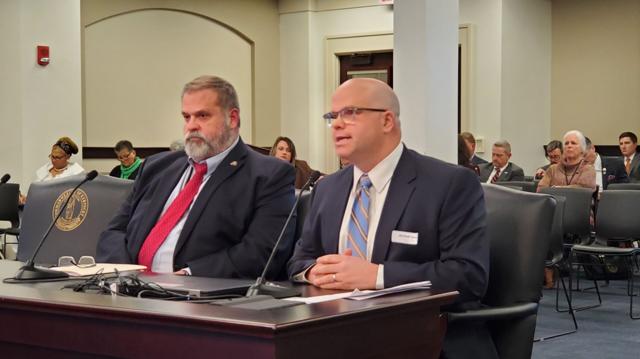Open Records bill gains passage of committee; KPA remains opposed
Published 11:33 am Friday, March 8, 2024

- Tags: News Photo: State 1. Cutline is at the bottom. Author: Special to… Senate approves making it easier for foster parents to qualify for child care assistance By Sarah Ladd Kentucky Lantern A Democrat’s bill aimed at making it easier for Kentuckians to become foster parents unanimously passed the Senate Thursday — after some friendly hazing aimed at the sponsor upon passing her first bill. Senate Bill 240 would allow foster parents in Kentucky to qualify for child care benefits while working outside the home or working remotely in the home. Currently they must work 20 hours a week outside the home to qualify for assistance. The sponsor, Louisville Democrat Cassie Chambers Armstrong, said in committee that it “will decrease barriers to families who wish to participate in foster care.” Chambers Armstrong won a special election in February 2023 to fill the Senate seat vacated by Democrat Morgan McGarvey’s election to the U.S. House. On the Senate floor she said clarifying remote work requirement eligibility for stipends is a “small but needed change that will make it easier for more people to become foster parents” in Kentucky. It can now go to the House for consideration. Sen. Cassie Chambers Armstrong, D-Louisville, presents her first bill, Senate Bill 240, in the Senate on Thursday. The child care legislation won support on the chamber floor. (LRC Public Information)
|
Getting your Trinity Audio player ready...
|
Legislation that would make changes to Kentucky’s Open Records Law was approved by the House State Government Committee on Thursday.
House Bill 509 is sponsored by Rep. John Hodgson, R-Fisherville. He told the panel the bill makes three revisions to the law, which has been in effect since the 1970s.
–Anyone working for a public agency or who is a board appointee, even an unpaid one, would have an official email account for them to do their official business.
–Those working for a public agency who conduct official business on personal accounts would be liable for discipline from their agency, or dismissal if they are board members.
–A public agency complying with both provisions listed above shall only be required to search for or produce to a requesting party electronic information or documents that are stored or contained in an agency-issued device or the agency-designated email account.
Michael Abate, an attorney representing the Kentucky Press Association (KPA), also testified before the committee. While saying he appreciated changes made by Hodgson before the bill was presented to the panel, Abate admitted he still had problems with the search provision of the measure and that the KPA maintained its opposition to the bill.
He noted there was a problem when Open Records requests were made to the Jefferson County Public Schools (JCPS) in the wake of bus transportation issues when the school year began.
“They requested emails and all records, but JCPS told us, ‘we only have like two emails, because the superintendent, transportation director and everyone else had been texting throughout this whole thing.’ We wanted to know what they were texting about and what was going on. JCPS maintained those aren’t public records. We think this is a loophole that can and should be plugged.”
Hodgson replied, “In addition to being an advocate for open records, I am also an advocate of personal privacy. I think we have a huge faultline approaching here between the intersection of those two points.”
He noted texts on personal devices are exempt, adding, “If there is some evidence of wrongdoing, if you can convince a court, you certainly have the opportunity to file civil or criminal charges and have a subpoena issued to access those records.”
The original version of HB 509 contained language that merged and modernized language from KRS 61.870 and KRS 61.878. However, Hodgson removed those sections of the bill after constituents raised concerns that 50 years of case law and opinions from the Office of the Attorney General based on the current KRS structure would be adversely affected.
“My public offer on HB 509 was that if folks could show me specific case experiences where the merging and modernizing of language from KRS 61.870 and KRS 61.878 would have hindered their ability to get records, I would change the language to avoid unintended consequences of the bill,” Hodgson said. “Many involved private citizens and constituents took me up on that offer, and we had some very constructive dialog about dozens of specific examples in their experience base. This is how the lawmaking process is supposed to work – with communication and collaboration – and I am grateful for their civic-minded input.”
The bill passed on a 12-4 vote, with two other members passing, and now heads to the House floor.




